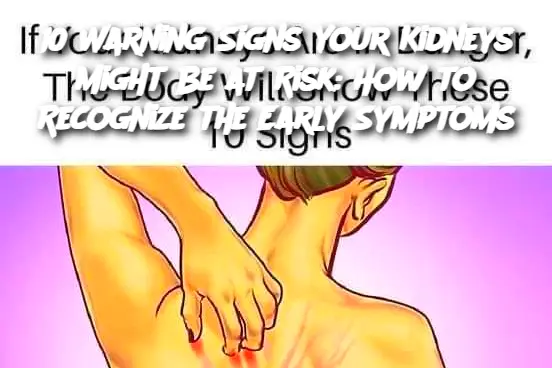What It Means: As kidney function deteriorates, waste products build up in the blood, leading to a condition known as uremia. This can cause nausea, vomiting, loss of appetite, and a metallic taste in the mouth.
Why You Shouldn’t Ignore It: Persistent nausea and poor appetite are common in the later stages of kidney disease. Ignoring these symptoms can result in malnutrition and weight loss.
5. Pain in the Lower Back or Side
What It Means: Pain or discomfort in the lower back or on one side of the body, near the kidneys, could indicate an infection or kidney stones. This type of pain can range from dull aches to sharp, stabbing pains.
Why You Shouldn’t Ignore It: Pain in this area should be addressed immediately, as it could be a sign of an infection (pyelonephritis), kidney stones, or other serious kidney conditions.
6. High Blood Pressure
What It Means: The kidneys play a key role in regulating blood pressure. When the kidneys are damaged, they may not properly balance sodium levels or fluid volume, leading to elevated blood pressure (hypertension).
Why You Shouldn’t Ignore It: Uncontrolled high blood pressure can further damage the kidneys and increase the risk of heart disease and stroke. If your blood pressure is consistently high, it’s important to see a doctor.
7. Itchy Skin and Rashes
What It Means: When the kidneys are unable to filter toxins effectively, waste can build up in the bloodstream, which may cause itching or rashes, especially on the legs, arms, or back.
Why You Shouldn’t Ignore It: Chronic itching can severely impact quality of life and may be an indication that your kidneys are no longer effectively detoxifying the body.
8. Shortness of Breath
What It Means: Kidney disease can lead to fluid buildup in the lungs, causing difficulty breathing or shortness of breath. Additionally, anemia caused by kidney dysfunction can also lead to feelings of breathlessness.
Why You Shouldn’t Ignore It: Shortness of breath should never be ignored, especially if it’s a new symptom. It could indicate kidney disease, heart problems, or fluid overload in the body.
9. Difficulty Sleeping
What It Means: People with kidney disease often suffer from sleep disturbances due to factors like restless legs, excessive fluid buildup, or pain. The need to urinate frequently during the night can also make it hard to get restful sleep.
Why You Shouldn’t Ignore It: Sleep deprivation can worsen kidney function, so if you find yourself waking up frequently at night or struggling to stay asleep, it’s worth discussing with a healthcare provider.
10. Metallic Taste in Your Mouth
What It Means: A buildup of waste products in the blood due to poor kidney function can cause a metallic taste in the mouth, known as “uremic fetor.”
Why You Shouldn’t Ignore It: A metallic taste can be an early sign of kidney failure, and if it’s accompanied by other symptoms like fatigue or nausea, it’s important to seek medical attention.
Conclusion:
Your kidneys are essential for maintaining the balance of your body’s fluids and filtering out toxins. If you notice any of the warning signs mentioned above, it’s important to take them seriously and seek medical advice. Early detection of kidney problems can help prevent further damage and improve outcomes. By staying informed and proactive about your kidney health, you can safeguard your overall well-being and ensure that your kidneys continue to function properly for years to come.
FAQ:
How can I prevent kidney problems? Maintaining a healthy diet, staying hydrated, exercising regularly, and managing your blood pressure and blood sugar levels are key steps in preventing kidney disease. Avoiding smoking and limiting alcohol intake can also help.
Are kidney problems reversible? In the early stages, kidney problems may be reversible or manageable with proper treatment. However, in advanced stages of kidney disease, such as kidney failure, treatment options like dialysis or a kidney transplant may be necessary.
How are kidney problems diagnosed? Kidney problems are often diagnosed through blood tests (checking levels of creatinine and glomerular filtration rate or GFR) and urine tests to check for protein or blood. Imaging tests may also be used to look for blockages or other abnormalities.
What should I do if I notice these symptoms? If you experience any of the warning signs listed, it’s important to consult a healthcare provider as soon as possible. They will perform tests to determine the cause and help you begin appropriate treatment.
Can dehydration cause kidney problems? Chronic dehydration can put stress on your kidneys and lead to kidney stones or other kidney-related issues. It’s important to stay hydrated to support healthy kidney function.
By recognizing the early warning signs of kidney distress, you can take action and protect your health before serious damage occurs. Stay aware of your body’s signals and prioritize your kidney health to live a longer, healthier life.
ADVERTISEMENT

